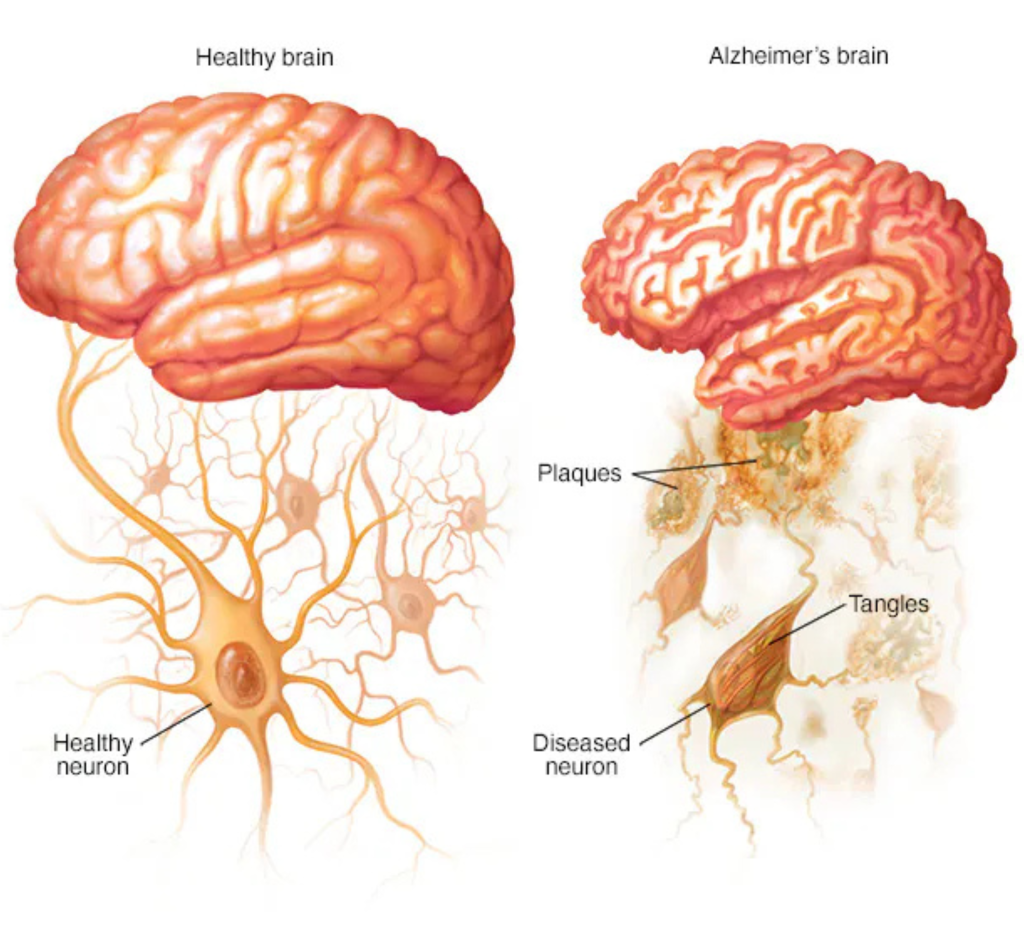Alzheimer’s disease is a progressive neurodegenerative disorder and the most common cause of dementia. It leads to a gradual decline in memory, thinking, behavior, and the ability to perform everyday activities. The disease is linked to abnormal buildups of amyloid plaques and tau tangles in the brain, which disrupt communication between neurons and eventually cause brain cell death.

Early symptoms typically include forgetfulness, confusion, and difficulty concentrating. As the disease progresses, individuals may experience disorientation, language problems, mood changes, and loss of independence. While the exact cause remains unclear, risk factors include age, genetics (such as the APOE-e4 gene), and lifestyle or cardiovascular health.
There is currently no cure for Alzheimer’s, but treatments can help slow progression and manage symptoms. These may include medications, cognitive therapies, and lifestyle interventions aimed at supporting brain health.
A4 Clinics provides transcranial Direct Current Stimulation (tDCS) as an innovative, non-invasive option to support cognitive function in individuals with Alzheimer’s disease. By applying a low-level electrical current to specific areas of the brain responsible for memory and attention, tDCS can enhance neural plasticity and improve communication between brain regions.
Clinical studies suggest that tDCS may help slow cognitive decline, boost memory performance, and improve attention in patients with early to moderate stages of Alzheimer’s. It is especially valuable as part of a broader therapeutic approach, offering a drug-free, well-tolerated method to support brain function and quality of life.
Alzheimer’s disease is a progressive neurodegenerative disorder and the most common cause of dementia. It leads to a gradual decline in memory, thinking, behavior, and the ability to perform everyday activities. The disease is linked to abnormal buildups of amyloid plaques and tau tangles in the brain, which disrupt communication between neurons and eventually cause brain cell death.

Early symptoms typically include forgetfulness, confusion, and difficulty concentrating. As the disease progresses, individuals may experience disorientation, language problems, mood changes, and loss of independence. While the exact cause remains unclear, risk factors include age, genetics (such as the APOE-e4 gene), and lifestyle or cardiovascular health.
There is currently no cure for Alzheimer’s, but treatments can help slow progression and manage symptoms. These may include medications, cognitive therapies, and lifestyle interventions aimed at supporting brain health.
A4 Clinics provides transcranial Direct Current Stimulation (tDCS) as an innovative, non-invasive option to support cognitive function in individuals with Alzheimer’s disease. By applying a low-level electrical current to specific areas of the brain responsible for memory and attention, tDCS can enhance neural plasticity and improve communication between brain regions.
Clinical studies suggest that tDCS may help slow cognitive decline, boost memory performance, and improve attention in patients with early to moderate stages of Alzheimer’s. It is especially valuable as part of a broader therapeutic approach, offering a drug-free, well-tolerated method to support brain function and quality of life.
A4 Clinics is a chain of clinics that provides advanced technology-enabled rehabilitation for patients with BRAIN DISEASES. This is the brain-child of Dr. Abha Agrawal, MD, FACP, FACHE (USA).
Copyrights © 2015-2025 All Rights Reserved by A4 Clinics Pvt. Ltd.